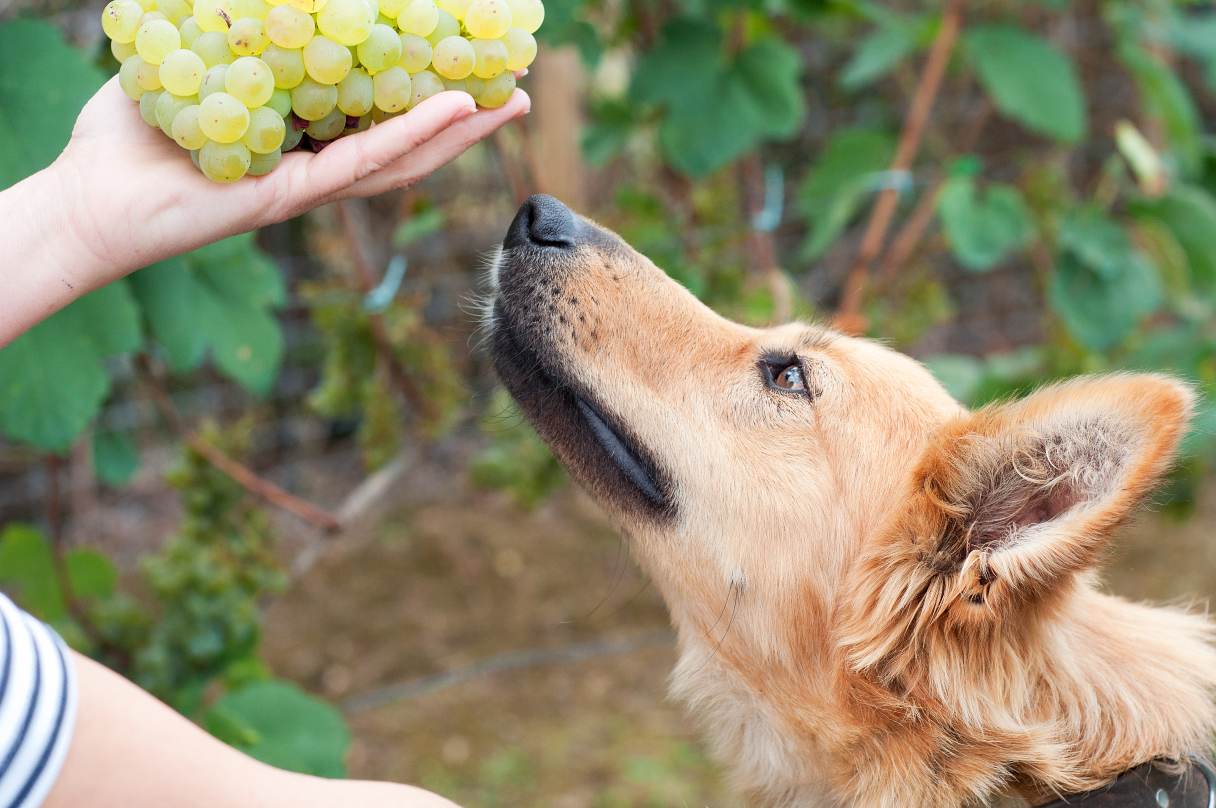We've all been there — you're eating a meal or snack and look down to see those big, brown puppy-dog eyes. It's hard to say no. In many cases, it's fine to slip your pup a tiny taste of your food, but when it comes to grapes, the answer is a definitive no.
Grapes can be extremely dangerous for dogs of all ages, with the potential to cause severe health issues or even be fatal. Whether seedless or seeded, commercial or homegrown, red or green, organic or nonorganic, all types of grapes and their dried counterparts pose a serious risk to our canine companions.
Are Grapes Good for Dogs?
No. Grapes can be extremely dangerous for puppies and dogs of all ages. All types of grapes can be very toxic — even fatal — to your dog.
Grapes in any form, including fresh and dried raisins, Zante currants and sultanas (golden raisins), belong to the Vitis species that is toxic to dogs. The exact cause is unknown, but it has been suggested that tartaric acid or potassium bitartrate may be the cause. Other theories suggest contamination with mycotoxins or pesticide residues may be responsible.
How Many Grapes Are Dangerous for a Dog to Eat?
Grapes are one of the most common foods that poison dogs, and no amount is safe — even a single grape or raisin could be a problem for your pup. If you have this fruit in your household, make sure your dog doesn't gobble any up by accident, especially the little boxes of raisins that many kiddos get for Halloween or from school parties. And don’t forget that raisins are found in many foods like granola and bread, so be sure to safeguard these products from your beloved furry family member.
What Should I Do if My Dog Eats One or More Grapes?
The biggest concern is acute kidney failure, and symptoms can develop if untreated. Vomiting is the most common symptom and may be accompanied by diarrhea, lethargy or weakness and/or loss of appetite. In many cases, the most severe signs are not seen until 24 to 48 hours after ingestion, and by then, acute kidney damage may already have begun to kick in.
Immediately contact ASPCA's emergency poison hotline (a consultation fee may apply) or your closest veterinarian or emergency veterinary hospital. The sooner you get your dog treatment, the better the prognosis will be.
The attending veterinarian will likely induce vomiting if your dog recently ate the fruit and may perform other diagnostics like bloodwork or a urinalysis. Bloodwork may show elevated kidney enzymes and possibly increased calcium or phosphorus, and the urine is likely to be very diluted. Neurological symptoms like tremors or seizures can also happen 24 to 72 hours after your dog eats grapes or raisins.
The veterinarian may recommend additional supportive care, depending on the status of your dog.
What Is the Prognosis if a Dog Eats One or More Grapes?
The prognosis of a dog who has ingested grapes depends on many factors, such as the amount they ingested, the timing of the treatment, the dog's response to treatment, the severity of symptoms and any preexisting kidney disease.
If symptoms were mild and/or the dog received treatment before symptoms developed, the prognosis is much better than if the kidneys started to fail. Dogs that do survive may still develop chronic kidney disease.
What Fruits Can You Offer a Dog Besides Grapes?
If you enjoy sharing tasty fruits with your dog, consider offering fresh bananas, blackberries or strawberries. Check with your regular veterinarian to make sure it’s OK for your dog, and remember to only give fruits as a treat. Healthy snacks should make up no more than 10% of your dog’s daily diet.
Don’t Feed a Dog Any Parts of a Grape
Avoid feeding a dog any part of a grape — including the fruit, stem or leaf — as well as raisins, sultanas, Zante currants or any food containing these ingredients.
CareCredit Credit Card Financing for Dogs
Taking good care of your pet's well-being from nose to tail is essential. Make sure to stay up to date on their regular checkups at the vet to help keep your pet happy and healthy for a lifetime of love. You can use your CareCredit credit card for pet care throughout the year for routine veterinary services as well as emergencies and surgeries.* Use our Acceptance Locator to find a veterinarian near you that accepts CareCredit.
CareCredit is there for you and your pet every step of the way. Continue your wellness journey by downloading the CareCredit Mobile App to manage your account, find a provider on the go and easily access the Well U blog for more great articles, podcasts and videos.
In addition to pet care, you can also use your CareCredit credit card for dentistry, cosmetic, vision, hearing, health systems, dermatology, pharmacy purchases, spa treatments and so much more within the CareCredit network. How will you invest in your health and wellness next?
Author Bio
Dr. Kathy Wiederkehr (Wentworth) has been practicing veterinary medicine at pet care facilities in California since 2001. Most recently, she served as medical director of the VCA PetPoint Medical Center and Resort in Irvine. She is a graduate of the University of Pennsylvania School of Veterinary Medicine and became board-certified as a diplomate in Canine and Feline Practice by the American Board of Veterinary Practitioners in 2010.








